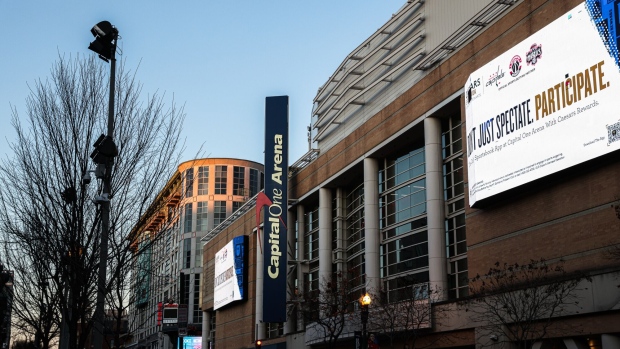Mar 28, 2024
Wizards, Capitals Arena Deal Eased by $1.2 Billion Muni Sale
, Bloomberg News

(Bloomberg) -- Washington, D.C.’s ability to offer the National Basketball Association’s Wizards and the National Hockey League’s Capitals more than $500 million for a new arena was eased by a refinancing last year that cut its interest bills.
In November, Washington sold $1.2 billion of municipal bonds in part to refinance higher-cost debt. That transaction, sold as the bond market was starting to rebound in November — reduced the city’s costs enough to make the sports financing possible and not hit a statutory limit on the size of its debt bills.
“While the transaction was not done specifically to allow for improvements to Capital One Arena, the debt service savings achieved did make possible the Mayor’s offer to Monumental Sports of $500 million to refurbish the arena,” according to Natalie Wilson, a spokesperson for Glen Lee, the district’s chief financial officer.
The new arena agreement was announced Wednesday by Mayor Muriel Bowser and Ted Leonsis, the billionaire owner of Monumental Sports & Entertainment, which owns the Capitals and Wizards. Under the deal, the city will provide more than $515 million toward the complete renovation of the arena, according to a statement.
Once a bustling place for nightlife, the area near the arena was hit hard during the pandemic and has struggled to come back as many federal government workers continue to work remotely. Officials were eager to prevent the teams from leaving, since games still draw considerable numbers of people to the area, and hope that the new area project will drive tourism, revenue, and jobs growth in the neighborhood.
The agreement also quashed Virginia Governor Glenn Youngkin’s plans to lure both teams across the Potomac River. He pitched a $2 billion economic development project, but it failed to gain traction among state lawmakers.
Washington refinanced its debt during the week of Nov. 13, when interest rates were coming down from their recent highs on expectations that the Federal Reserve would begin easing monetary policy this year.
Wilson said the muni deal saved nearly $70 million. Before the transaction, the district’s debt ratio — measured by total debt service as a percentage of general fund expenditures — reached a record high of 11.924%, just shy of the statutory limit of 12%.
While the CFO’s office wouldn’t provide details of the current debt ratio which will be released as part of Bowser’s proposed budget next week, it “remains within our debt limit,” Wilson said.
©2024 Bloomberg L.P.





